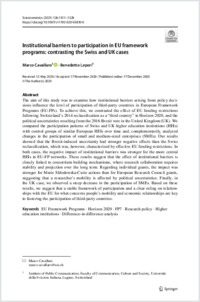Institutional barriers to participation in EU framework programs : contrasting the Swiss and UK cases
- Cavallaro, Marco Istituto di comunicazione pubblica (ICP), Facoltà di comunicazione, cultura e società, Università della Svizzera italiana, Svizzera
- Lepori, Benedetto Istituto di comunicazione pubblica (ICP), Facoltà di comunicazione, cultura e società, Università della Svizzera italiana, Svizzera
-
17.12.2020
Published in:
- Scientometrics. - 2021, vol. 126, no. 2, p. 1311–1328
EU Framework Programs
Horizon 2020
FP7
Research policy
Higher education institutions
Difference-in-difference analysis
English
The aim of this study was to examine how institutional barriers arising from policy decisions influence the level of participation of third- party countries in European Framework Programs (EU-FPs). To achieve this, we contrasted the effect of EU funding restrictions following Switzerland’s 2014 reclassification as a “third country” in Horizon 2020, and the political uncertainties resulting from the 2016 Brexit vote in the United Kingdom (UK). We compared the participation patterns of Swiss and UK higher education institutions (HEIs) with control groups of similar European HEIs over time and, complementarily, analyzed changes in the participation of small and medium-sized enterprises (SMEs). Our results showed that the Brexit-induced uncertainty had stronger negative effects than the Swiss reclassification, which was, however, characterized by effective EU funding restrictions. In both cases, the negative impact of institutional barriers was stronger for the more central HEIs in EU-FP networks. These results suggest that the effect of institutional barriers is closely linked to consortium building mechanisms, where research collaboration requires stability and projection over the long term. Regarding individual grants, the impact was stronger for Marie Skłodowska-Curie actions than for European Research Council grants, suggesting that a researcher’s mobility is affected by political uncertainties. Finally, in the UK case, we observed a steep decrease in the participation of SMEs. Based on these results, we suggest that a stable framework of participation and a clear ruling on relationships with the EU for what concerns people’s mobility and economic relationships are key to fostering the participation of third-party countries.
- Language
-
- English
- Classification
- Higher Education Institutions
- License
- Open access status
- hybrid
- Identifiers
-
- RERO DOC 333162
- DOI 10.1007/s11192-020-03810-0
- ARK ark:/12658/srd1319210
- Persistent URL
- https://n2t.net/ark:/12658/srd1319210
Statistics
Document views: 225
File downloads:
- Fulltext: 211
